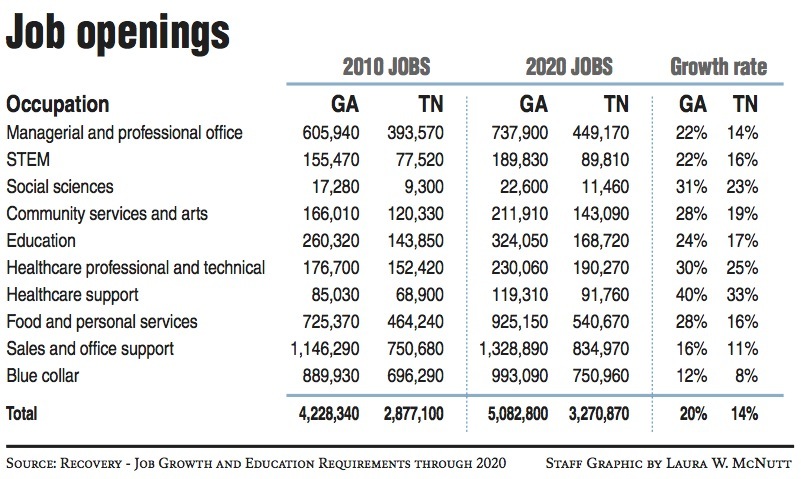FINDINGS
• There will be 55 million job openings in the national economy through 2020. In Tennessee, there will be 394,000 openings for new jobs and another 695,000 jobs will open as baby boomers retire.• Most Tennessee job growth will come in three fields: management of companies and enterprises, 36 percent; health care and social assistance, 31 percent; and education services, 29 percent.• By 2020, 65 percent of all U.S. jobs will require education and training beyond high school. In this category, Tennessee ranks near the bottom of states, with only 58 percent of jobs here expected to require post-secondary education.• Health care and social assistance will surpass the government by 2020 as the sector with the largest employment in Tennessee, with 405,000 jobs overall.Source: "Recovery: Job Growth and Education Requirements through 2020," Georgetown University Center on Education and the Workforce
Even with an improved economy, getting a job is only going to get tougher.
A new national study predicts that jobs in Tennessee and across the nation increasingly will demand more advanced education and training.
Job growth is projected in many high-skilled areas, while jobs in agriculture, forestry, fishing, hunting and manufacturing are expected to decline.
In Tennessee, careers in management, education services, health care and social assistance are all poised to see the most growth through 2020, according to the report released today by the Georgetown University Center on Education and the Workforce.
Aside from more education, employers will most value an employee's judgment, communication, analysis and administrative skills, according to findings in the study, "Recovery: Job Growth and Education Requirements through 2020." At the same time, the demand for physical skills will continue to decline.
"For Tennessee and Georgia, some of the fastest-growing occupational clusters are the ones that use education most intensely," said Nicole Smith, a research professor and senior economist at Georgetown who co-authored the report.
The study's results mirror other national findings that predict the economy will continue to shift away from blue-collar careers toward more high-skilled jobs as more basic tasks continue to be automated or outsourced. And that means states need to make sure they have a competently trained workforce to fill those more demanding positions.
"What has happened in the past is if the workforce isn't there, industry picks up and goes someplace it can find the workforce," she said.
Gov. Bill Haslam has set a statewide goal of getting more than half of the state's adults to complete associate or bachelor's degrees by 2025. But a national study released this month predicted Tennessee wouldn't come close. While college attainment rates are improving, the Lumina Foundation's report predicted that the state will reach only about 39 percent by 2025 at the current pace.
In addition to just getting more people through quality education and training programs, businesses and higher education institutions are increasingly cooperating to make sure that students who complete programs will have the skills needed to fill jobs that exist.
Some of that may be because companies are less willing than in the past to train new hires. Smith said the compact between industry and colleges has changed. The notion that colleges create trainable graduates is gone -- they must now leave school ready to hit the ground running in their careers.
"We're still in an employer's market and employers have the flexibility to ask for whatever they want," Smith said. "And employers are asking for a lot."
Dalton State College has altered or even terminated some of its programs in response to changing workforce needs.
"We certainly don't want to offer programs that aren't going to get people anywhere," said Sandra Stone, vice president of academic affairs.
Different department heads survey nearby companies, Stone said, to make sure graduates are meeting workplace expectations. The chemistry department beefed up its statistics and technical writing requirements after area chemical companies suggested it. And the School of Education's dean consults local school principals to make sure student teachers and new hires are up to par.
Other efforts are also under way to help get more people through degree programs. A new all-online degree was recently approved. And some departments are easing up on credit requirements, allowing people to test out of certain classes or receive credit for work experience.
Those kind of accommodations aren't yet embraced by the entire higher education community, Stone said, though state colleges and community colleges are more likely to be on board.
The college is trying to be more responsive to the needs of employers. But Stone said too much focus on job skill sets can sometimes lead schools to de-emphasize liberal arts studies, which often help students improve their soft skills like written and verbal communication, teamwork, leadership and appreciation for diversity -- other muscles employers often say they want their employees to flex.
That means schools must strike a delicate balance between straight job training and a more holistic educational experience, Stone said.
"We're trying to do a little bit of everything and trying to incorporate some of those soft skills," she said.
Executives at BlueCross BlueShield of Tennessee have paired with the University of Tennessee at Chattanooga to make sure course work is on par with the demands of the job. The company's IT and informatics staffers have weighed in on UTC's curriculum and training in those programs. The state's largest health insurer, BlueCross has about 5,100 employees -- 4,270 of whom are located in Chattanooga.
Though some of the area's biggest companies have complained about the skill set of job candidates coming to them, BlueCross by and large doesn't struggle to fill open positions, said Gary Steele, director of talent management.
"Sometimes we may have to extend our search areas outside just Chattanooga," he said. "But at the present time we're not having any great difficulty."


